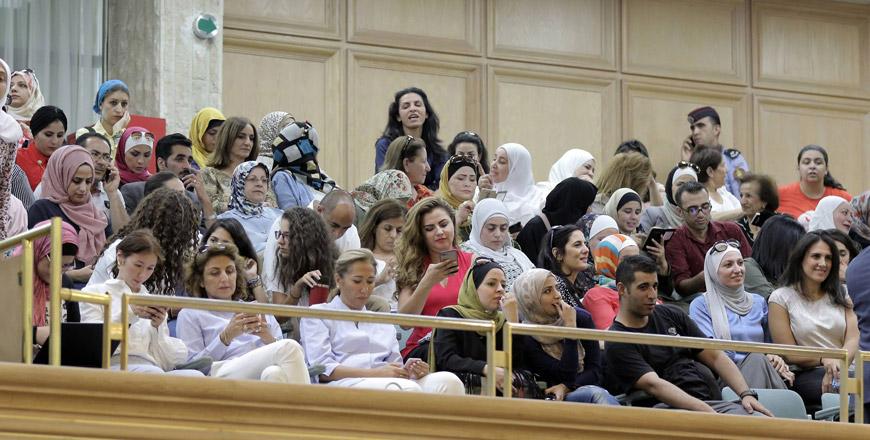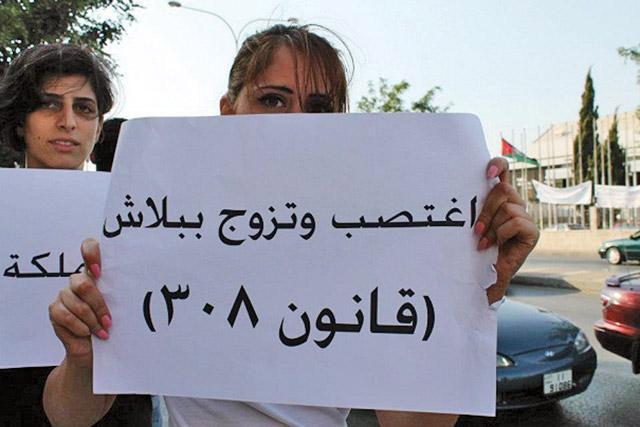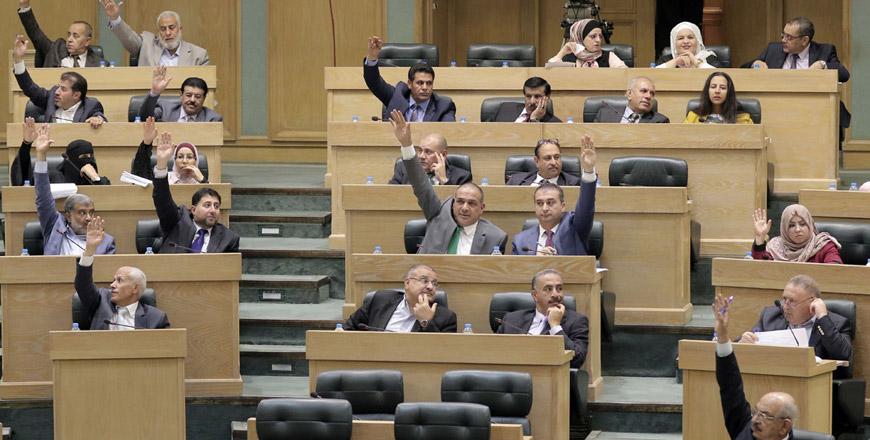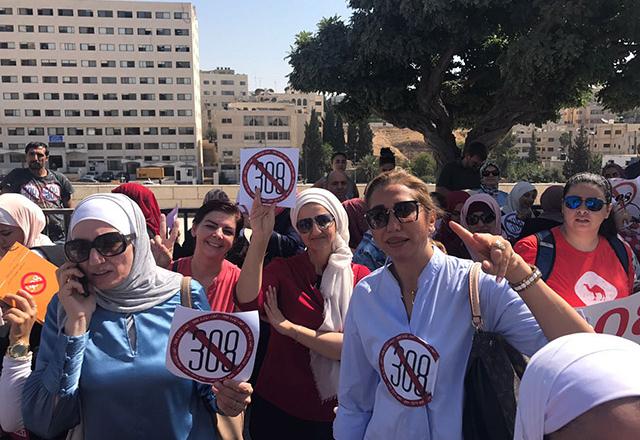You are here
Activists hail abolition of Article 308
By Rana Husseini - Aug 01,2017 - Last updated at Aug 01,2017

Activists cheered upon hearing Speaker of the Lower House Atef Tarawneh’s announcement that the Lower House voted in favour of the abolishment of Article 308 (Petra photo)
AMMAN — Jordanian activists and MPs on Tuesday expressed their satisfaction with the Lower House’s decision to abolish Article 308, which allowed rapists to escape punishment if they married their victims.
In a historic move, the Lower House of Parliament voted to abolish the controversial Article 308 amid heated debate and assurance by Prime Minister Hani Mulki that his government was in favour of abolishing the article “in order to protect Jordanian family values”.
The government had previously suggested the complete scrapping of the article. However, as the amended Penal Code reached the Lower House and following a long debate among deputies, the Lower House Legal Committee had decided to keep the article and include exceptions in which offenders would not face punishment.
Exceptions included sexual acts involving girls aged between 15 and 18, which provoked a heated debate among MPs and the women’s movement.
As a result, more than 200 men and women from various civil society organisations staged a sit-in outside Parliament before Tuesday’s session, then headed to the House’s balconies to express their support for the cancellation of Article 308.
They cheered and saluted each other upon hearing Speaker of the Lower House Atef Tarawneh’s announcement that the Lower House voted in favour of the abolition of the article.
Jerash Deputy Wafa Bani Mustafa, one of the leading female MPs who worked tirelessly for the scrapping of the article, expressed her joy with the decision.
“Article 308 is gone for good. Today, most of our colleagues at the Lower House showed that they really had an honourable stand towards women’s rights,” Bani Mustafa told The Jordan Times.
Jordanian National Commission for Women Secretary General, Salma Nims, also expressed her pride following the conclusion of the session.
“We are so happy to be part of this important day for women and this is a proof that the civil movement and lobbying have made a difference among our respected deputies and society as a whole,” Nims told The Jordan Times.
Prior to the vote, several women activists, representing 63 local organisations, had taken to social media to organise a campaign lobbying the Lower House to abolish Article 308, rather than adopt any amendments.
They also met with MPs from the Legal Committee on Monday to voice their demands and lobby for the article’s abolition.
They also circulated an online petition calling for the cancellation of Article 308, which had been signed by over 5,000 people.
Lawyer and activist Noor Imam expressed her happiness and pride shortly after the conclusion of the session.
“This is truly a day to remember for Jordanian women and we thank the Lower House for voting to abolish Article 308,” Imam told The Jordan Times.
Deputy Qais Zayadin (Amman, 3rd District) said the women’s movement had played a “big role” in Tuesday’s decision.
“The women’s movement’s tireless work paid off today and helped Jordan become a better country and a civilised one,” he told The Jordan Times following the session.
Amman 3rd District MP Khalid Awad, who also pushed for the abolition of Article 308, added that “the women’s movement in Jordan, through its activism on this matter, has shown the world that it was the one that contributed to today’s vote.”
Meanwhile, Islamist MPs Hayat Mseimi (Zarqa, 1st District) and Dima Tahboub (Amman, 3rd District) expressed their anger over the way the “session proceedings went, although they were in favour of cancelling the article”.
“We are with cancelling the article, but our reasons differ because we look at it from a Sharia [Islamic law] point of view,” Mseimi told The Jordan Times.
Tahboub agreed with Mseimi, saying that “the way the speaker of the Lower House conducted the debate and called for a vote was a play, because we were not given the chance to talk about our opinions regarding this article.”
“We wanted to talk about our opinions from a Sharia perspective and raise society’s awareness regarding the need to rehabilitate the shelters in order to ensure protection and security for victims of sexual assault,” Tahboub told The Jordan Times.
Both Mseimi and Tahboub stressed that “they were voting for the abolition of Article 308, rather than allowing for exceptions, to prevent adultery and fornication in the society”.
Bani Mustafa agreed that victims of sexual assault need special attention and care from the government.
“Abolishing Article 308 is only the beginning. The government now has a responsibility to ensure the proper social, economic and psychological rehabilitation and care of individuals who are subjected to sexual assault, to treat them as victims and to enable them to resume their lives in spite of the trauma,” she added.
Former minister of social development Reem Abu Hassan, who was advocating for amending Article 308, said “the outcome of the vote was an extreme disappointment, despite the tremendous effort the Legal Committee of the Lower House put into hearing out and examining the different perspectives and consequences with regards to abolishing or amending the article.”
Abu Hassan told The Jordan Times that the proposed amendments allowed for the option of marriage in three instances, where consent was present, out of the 16 forms that could be applied in the original article.
The campaign for the abolition of Article 308 was “not based on scientific data or proper studies, which would have alerted the deputies to the dangerous social and individual effects of abolishing this article, including on the victim and the children born as a result”, activist Abu Hassan argued.
“I have fulfilled my duty in making the voice of female victims heard but, unfortunately, the vote disregarded and neglected the best interest of those children, who will be brought into this world as illegitimate children. This will eventually threaten the social cohesion, as well as neglecting the means to rehabilitate and ensure the victims have a better life,” Abu Hassan said.
President of the Legal Committee Mustafa Khasawneh told The Jordan Times that the committee was in favour of amending the article to protect women and children.
“We heard dozens of experts, officials and civil society organisations and our position was based on scientific evidence and data. We are only trying to protect females, who are engaged in consensual sexual activities, from being harmed or killed,” Khasawneh said.
The committee also wanted to ensure that, in cases of pregnancy, “the child born will be raised in a proper environment”, he added.
Khasawneh insisted that “whoever called for the abolition of that article believes that they won. However, we, at the legal committee, are more preoccupied by women’s rights than these people”.
Since Article 308 has now been cancelled, perpetrators of sexual assaults, including rapes, will be tried under the Penal Code’s articles related to the concerned offence, which were recently amended by the Lower House, Bani Mustafa explained.
The penalty for individuals who rape girls “under the age of 15 is the death penalty, between the age of 15 to 18 is 20 years in prison and, over 18, the maximum punishment is 15 years in prison,” she continued.
Bani Mustafa added that, in cases of consensual sex, “the amended punishment is 30 years if the victim was between the age of 12 and 15 and a minimum of 15 years if the victim was between the age of 15 and 18”.
A Royal committee had suggested abolishing the article in February and the government endorsed the decision shortly afterwards.
Related Articles
AMMAN — Women activists and civil society groups said they will stage a sit-in in front of Parliament today to reiterate their demands for t
AMMAN — HRH Princess Basma on Wednesday praised the abolition of Article 308 by the Lower House of Parliament a day earlier, saying it was a
AMMAN — In a historic vote on Tuesday, the Lower House of Parliament decided to abolish the controversial Article 308 of the Penal Code that

















